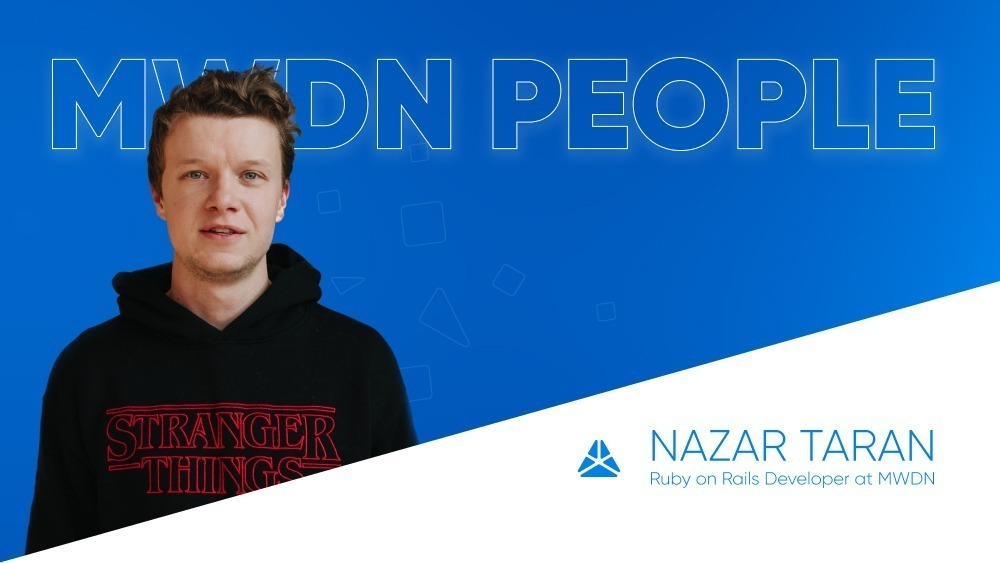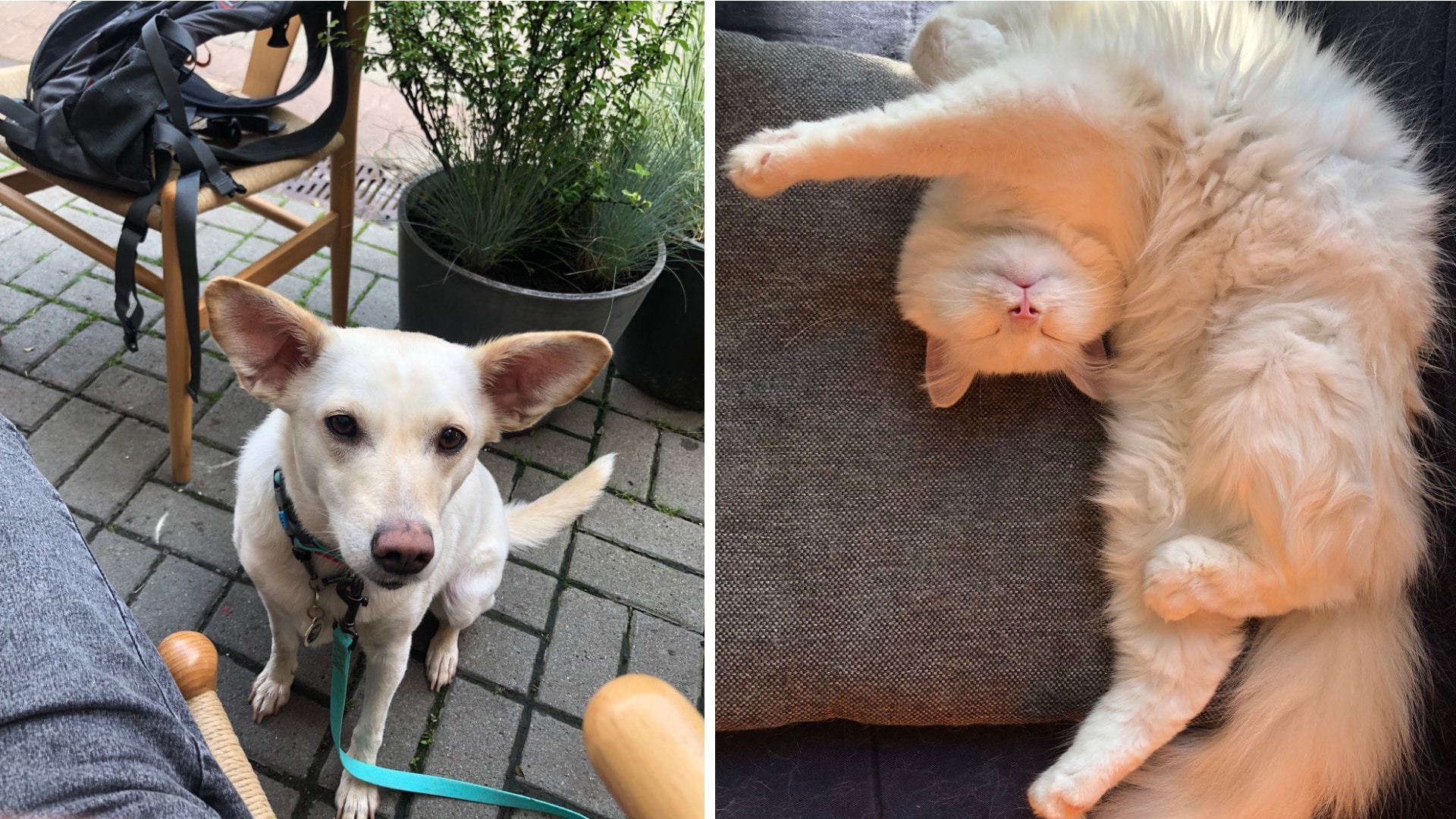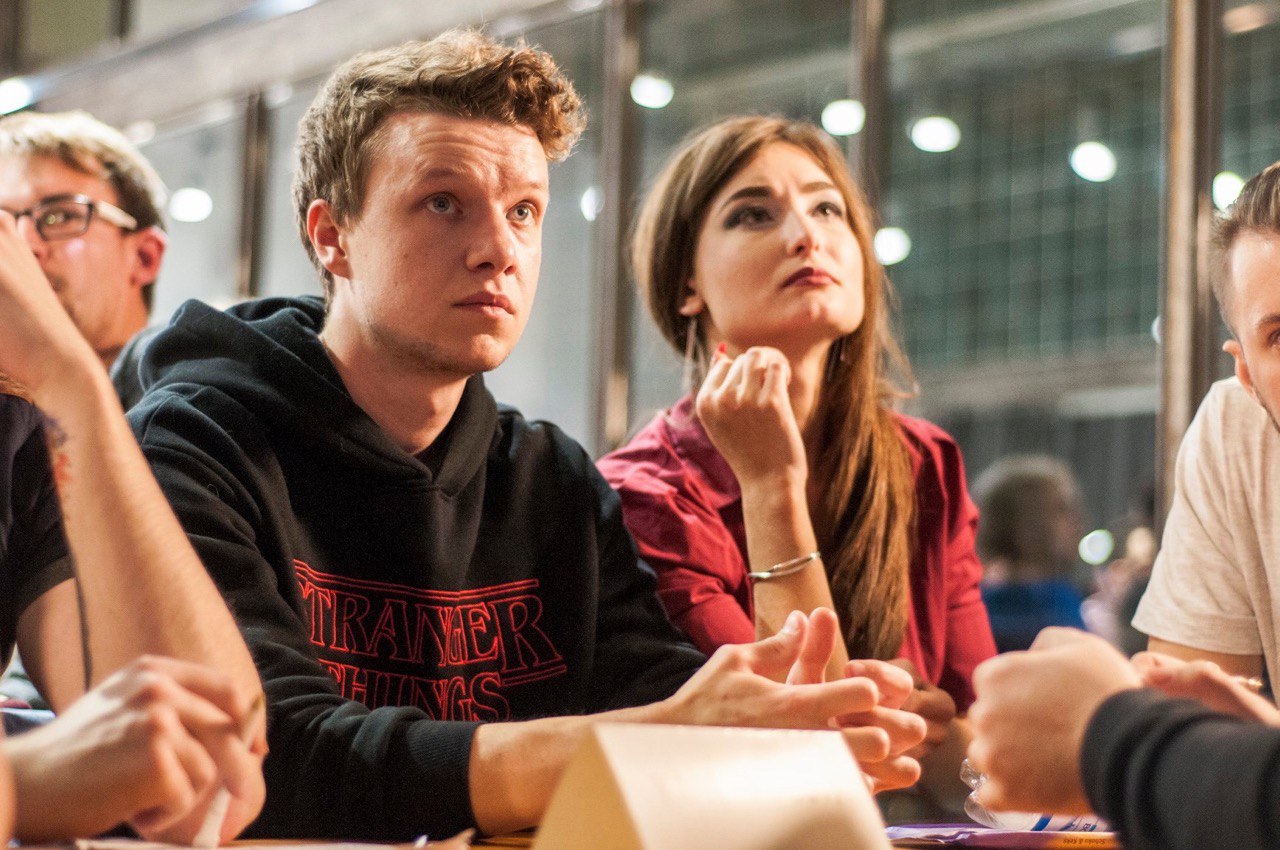
We continue to introduce our large MWDN family. Today we want to tell you more about Nazar Taran, a Ruby on Rails developer with over eight years of experience who have three cats and an honor degree in Psychology. According to his colleagues and clients, he is one of the kindest, most diligent, and most comfortable-to-work-with guys on our team. Read Nazar’s answers to find out what makes him so likable and such a special part of MWDN.
1. Tell a bit about yourself. How old are you? What do you do at MWDN? Where do you live? When have you started working in IT?
My name is Nazar, and I’m 29 years old. I was born and raised in Ivano-Frankivks. I still live in this city, and sometimes I wish it were more like San Francisco (the only similarity between the two cities is a second part of their names).
I have been working in IT for eight years, I started when I was 21. I have a master’s degree with honors in Psychology. When I was studying at the university, most of my friends started coding (they were students of computer sciences). I saw what their office looked like – with comfy furniture, internet, coffee, flexible schedule, and not that bad boss. What else would you need?
Getting into IT was not that bad of an idea, as my future career at that moment looked quite hazy. The psychotherapist career required additional training for five to six years and then another ten years of hands-on experience, while the path from “Trainee” to “Middle” developer was about to take 12 to 18 months. That looked like a quantum leap (Oh, boy).

2. Why have you chosen Ruby on Rails?
Working with RoR wasn’t my conscious decision. My friend, who agreed to become my mentor, has just started a transition from PHP to Ruby. So, I had two options – to learn Ruby or to teach school kids how to solve the Lüscher test. Now I still mainly work with Ruby. Apart from that, I also know and use JS and Golang.
3. Why did you decide to study Psychology?
If given the opportunity, everyone chooses a profession according to the type of personality and the experience that formed this personality. For example, psychopaths choose politics or surgery. People who are drawn to crime become either criminals or policemen. If you’re prone to addictions, you would probably consider addiction medicine or substance abuse (I know the latter is not technically a profession). At the same time, people with many “inner demons,” traumas, or self-reflections on their existence go to psychology or philosophy. Which I actually did.
4. Does a psychology degree add any benefits to your current job?
A psychology degree doesn’t help anyone with anything. What does help is psychotherapy. Six to seven years of working with a psychotherapist really change a person’s life. For the better. Or not for the better. Anyway, you become a more unrestrained individual.
Old mental traumas heal, the eye stops twitching, it becomes easier to breathe, and it becomes easier to be yourself. And since any work is always about people and for people, it is easier and more pleasant to interact with someone who is okay with themselves, doesn’t spew poison and saliva, and doesn’t try to replay scenarios of their childhood traumas on the others. And when it is easy and pleasant for you to communicate/work with someone, this is already half of a successful career. The second half is dutiful work and diligence, but psychotherapy isn’t a strong helper here.
5. What’s your “superpower”? What makes you different from the others?
What distinguishes me from others is type 1 diabetes in the stage of subcompensation. I would like to say that a sense of humor is my superpower, but I’m afraid that would be a lie. My other peculiarities are stubbornness in unimportant things and absolute financial irresponsibility. Oh, and I also know a lot of song lyrics by heart, if that counts.
6. Do you have pets? Tell a bit about them.
My wife and I have three cats: Mona, Ting, and Marcel. We also have a dog, Baileys. All were stray pets or were adopted from a shelter. Cats are closer to me “spiritually” and much easier to care for. There’s not much more I can tell about them, I’m afraid their lives are even less interesting than mine. Once, Baileys found two hryvnias in the park. I was very proud of her that day.

7. Do you have any hobbies? Something that takes your time, energy, and resources apart from work?
For a long time, I did pub quizzes. My friends and I organized one in Ivano-Frankivsk. We “franchised” the Lviv quiz, adding our ideas to it. The best quiz I wrote, designed, and conducted was a Harry Potter quiz. And the opus magnum of our organization became “Inglorious quiz,” a post-ironic quiz where we had as much fun as possible in terms of content and allowed ourselves a lot in terms of conducting. When a full-scale war broke out, my friend, who was a co-creator and presenter, went to the front line, and another friend of ours got a job at Meta a year before that. So, at the moment, there’s nobody left to do quizzes.
This year, my main hobby that “takes time, energy, and resources” is worrying, reflecting, and volunteering a little.
8. What’s the meaning of life?
I don’t think life has a meaning. And I don’t think anyone really needs that meaning. Living can be interesting, and it is your choice to be interested or not. Life is absurd and pointless. It’s great that sometimes it’s at least funny.
9. What technological or scientific breakthrough do you expect the most?
I would like to witness the time when humanity will be able to transfer personality into the digital field. Like is described in the books of Watts, Rajaniemi, or Morgan. I love sci-fi, by the way. You can find many interesting ideas in fiction.
10. Who is your favorite movie or literary hero? The one you would like to be like?
One of my favorites is Holden Caulfield. I like his style, spleen, and frankness. Another is, perhaps, the lyrical hero of Bukowski or Zhadan in their alcoholic trips.
11. If you could live for a month in any era in any place, where and when would you spend that month?
If I could choose when to be born, I would prefer to be born in the distant future. The further, the better. At least 100-150 years later because humanity is always moving forward. We are currently living in the best of times (in a global sense, locally, these are the worst times in the last 30 years, that’s for sure), and it will only get better. And it doesn’t matter where you were born. Imagine you woke up in the morning, and the year is 2170. What difference does it make where you are? Everything and everywhere is new, incomprehensible, and interesting.

12. How do you stay efficient and productive during these times? What helps you keep your thoughts together?
Dissociation, work, and Army donations.
13. Where were you on February 24? How exactly has your life changed since that date?
On the 24th, I was in my apartment. I woke up early from the noise of airplanes flying non-stop. It is difficult for me to describe how my life has changed. Right now, apart from PCs, we have uniforms, helmets, ammunition bags, backpacks, water filter tablets, dry showers, and much more in our office. We talk about death more often than we discuss the weather. I haven’t felt “easy” for more than a year. So, everything has changed. The way you look at things. The way you decide what is essential and what is not. Plans for the future. Dreams. Feelings.
14. In your opinion, what percentage of the income should Ukrainian developers donate to the armed forces?
I think 35-50% of income is okay. This year, I gave 1.6 million hryvnias to the army and volunteering organizations.
Content
- 1 1. Tell a bit about yourself. How old are you? What do you do at MWDN? Where do you live? When have you started working in IT?
- 2 2. Why have you chosen Ruby on Rails?
- 3 3. Why did you decide to study Psychology?
- 4 4. Does a psychology degree add any benefits to your current job?
- 5 5. What’s your “superpower”? What makes you different from the others?
- 6 6. Do you have pets? Tell a bit about them.
- 7 7. Do you have any hobbies? Something that takes your time, energy, and resources apart from work?
- 8 8. What’s the meaning of life?
- 9 9. What technological or scientific breakthrough do you expect the most?
- 10 10. Who is your favorite movie or literary hero? The one you would like to be like?
- 11 11. If you could live for a month in any era in any place, where and when would you spend that month?
- 12 12. How do you stay efficient and productive during these times? What helps you keep your thoughts together?
- 13 13. Where were you on February 24? How exactly has your life changed since that date?
- 14 14. In your opinion, what percentage of the income should Ukrainian developers donate to the armed forces?
